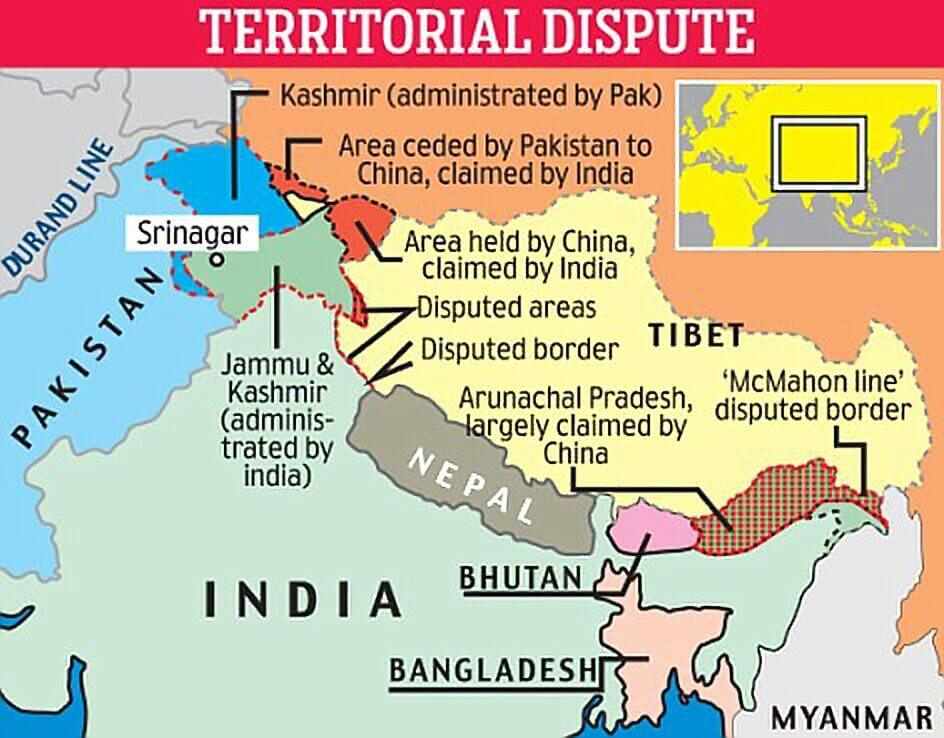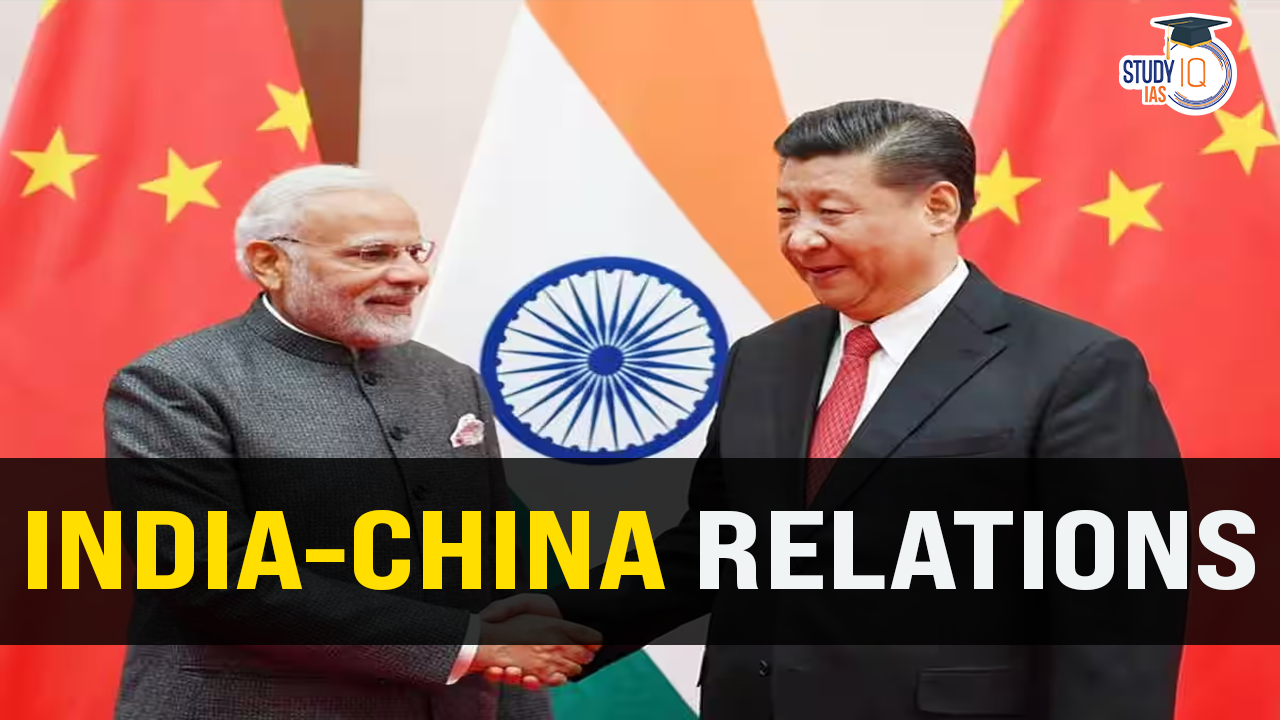Table of Contents
Context: April 1 2025, was the 75th anniversary of the establishment of diplomatic relations between China and India. Under Xi Jinping, China has increasingly shifted from Deng Xiaoping’s pragmatic approach to assertive nationalism.
More in News
- Under his leadership, China is aiming to restore Qing-era frontiers which is fueling tensions, especially along its borders like the Himalayas.
- The border skirmishes with India in Depsang (2013), Demchok (2016), Doklam (2017), and Galwan (2020) serve to confirm this hypothesis.
India-China Relations: Evolution of Ties
India and China, two of the world’s greatest economies and largest countries, share a complex relationship characterized by cooperation in economics, border conflicts, and strategic rivalry. India-China Relations have developed with time, guided by historical dynamics, trade exchanges, and international challenges.
Early Years (1950s-1960s)
- After India’s independence in 1947, the leaders of both India and China, Jawaharlal Nehru and Mao Zedong, envisioned a close friendship based on shared historical and anti-colonial sentiments.
- In 1950, India recognized the People’s Republic of China and established diplomatic relations.
- The two countries signed the Panchsheel Agreement in 1954, emphasising peaceful coexistence and non-interference in each other’s internal affairs.
- However, border disputes over the region of Tibet escalated tensions, leading to the Sino-Indian War in 1962, which China won decisively.
Strategic Distance (1970s-1980s)
- After the war, India and China had minimal diplomatic and trade relations, and mistrust prevailed.
- India’s growing proximity to the Soviet Union and China’s rivalry with the USSR further strained the relationship.
- In 1978, Deng Xiaoping’s economic reforms in China initiated a period of economic growth and openness, paving the way for improved relations.
Efforts for Normalisation (1980s)
- In the 1980s, both countries sought to normalise relations through diplomatic engagement and confidence-building measures.
- In 1988, Indian Prime Minister Rajiv Gandhi visited China, marking a significant step in improving ties.
- The two sides signed agreements to maintain peace and tranquillity along the disputed border, leading to the establishment of the Working Mechanism for Consultation and Coordination (WMCC) in 2012.
Post-Cold War Era (1990s onwards)
- With the end of the Cold War, both India and China aimed to develop a more cooperative relationship.
- Economic engagement became a central pillar of their engagement, with trade and investment increasing significantly.
- In 2003, the two countries agreed on the formation of the Special Representatives mechanism to address the boundary question.
- However, border disputes, particularly over the regions of Aksai Chin and Arunachal Pradesh, persisted and occasionally led to military standoffs.
Recent Developments In India-China Relations
In recent years, India-China relations have faced significant challenges.
- De-escalation began towards the end of 2024, with operations easing at several friction points along the LAC.
- Formal statements of progress came just before the BRICS Summit in Kazan, Russia (October 2024).
- A tentative India-China Border Patrolling Agreement was introduced — though lacking full details, it indicated an intent to manage on-ground tensions.
- Talks are underway to revive the Special Representative (SR) Dialogue, a high-level mechanism for resolving boundary issues.
India-China Border Dispute Sector-wise

| India-China Border Dispute Sector-wise |
India-China Border Disputes are broadly divided into three sectors i.e., Western Sector, Middle and Eastern Sector.
Western Sector
Middle Sector
Eastern Sector
|
Stances of India and China at the 23rd SR Meeting
India’s Stance
- Acknowledgement of Frictions: Explicit reference to the border tensions that began in 2020.
- Focus on Specific Outcomes:
- Emphasized new patrolling arrangements.
- Highlighted the conclusion of the disengagement process in some areas.
- Mentioned the resumption of the Kailash Mansarovar Yatra, data sharing on trans-border rivers, and border trade.
- Approach to Border Management: Stressed coordination between diplomatic and military mechanisms to maintain peace.
- Avoided promoting direct exchanges between border personnel, reflecting the no-patrolling buffer zones established along the Line of Actual Control (LAC).
- Reluctance to Reference Existing Agreements: Did not emphasize the 2005 Agreement on Political Parameters and Guiding Principles.
| 2005 Agreement on Political Parameters and Guiding Principles |
Key Features of the Agreement
|
China’s Stance
- Evaluation of Solutions: Positively reviewed the progress made on border-related issues.
- References to Agreements: Cited the 2005 Agreement but with little weight given its repeated violations.
- Strategic Perspective: Indirectly conveyed satisfaction with the disengagement process as a step forward in reducing tensions.
Conclusion of the Meeting
- Progress Highlighted: Both sides acknowledged some progress on disengagement and new patrolling arrangements.
- Agreed on the need for continued diplomatic and military coordination.
- Unresolved Issues: No concrete steps or timelines for de-escalation were agreed upon.
- Persistent differences in expectations and interpretations of agreements remained apparent.
- Broad Takeaway: India emphasized reducing tensions and maintaining peace, reflecting reduced expectations for a swift resolution.
- China appeared content with the slower pace of disengagement, which it views as a strategic gain.
Areas of Cooperation Between India-China Relations
Political Cooperation
- Establishment of Diplomatic Relations: India became the first non-socialist bloc country to establish diplomatic relations with the People’s Republic of China in 1950.
- High-Level Visits: The exchange of visits by top leaders, such as Prime Minister Rajiv Gandhi’s visit in 1988 and Prime Minister Narendra Modi’s visits in 2014, 2015, and 2018, have contributed to improving bilateral relations.
Economic Cooperation
- Bilateral Trade: Bilateral trade between India and China reached US$136.2 billion in 2023.
- India became one of the largest markets for “project exports” from China.
- Investments: According to the Ministry of Commerce & Industry, China stands at 20th position with only 0.43% share or $2.45 billion total FDI equity inflow into India from April 2000 to December 2021.
- Chinese investments in India and Indian investments in China have been increasing, particularly in sectors like IT, pharmaceuticals, and automobiles.
- Economic Potential: With a combined market of over 2.7 billion people and a GDP representing 20% of the world’s total, there is immense potential for further economic cooperation between India and China.
Science and Technology Cooperation
- Both countries have organized joint research workshops to foster collaboration and innovation in the field of science and technology.
- NASSCOM of India established three IT corridors in Dalian, Guizhou, and Xuzhou in China, enhancing collaboration in information technology.
Cultural, Educational and People-to-People Exchanges
- The resumption of the pilgrimage (yatra) for Indian pilgrims to Mount Kailash and Lake Manasarovar in Tibet in 1981.
- Establishment of over 10 pairs of sister cities/provinces and increased personnel exchanges, with over one million exchanges recorded.
- Yunnan Minzu University in China became the first university outside of India to award a Master’s degree in yoga.
- The Indian community in China is expanding, with current estimates placing the population at approximately 94,439.
- A significant portion of this group consists of students—over 18,000—who are enrolled in various universities across China.
Defence Cooperation
Despite limited defence collaboration, notable advancements have occurred:
- 2016 marked their inaugural Defense Ministers’ meeting.
- “Hand-in-Hand,” a joint military exercise in 2017, aimed at improving mutual comprehension and counterterrorism skills.
- Implementation of the “China-India Plus” model, including successful joint training programs for Afghan diplomats, as a new model of cooperation in third-party countries.
Multilateral Cooperation
- BRICS: India and China, along with Brazil, Russia, and South Africa, participate in BRICS, fostering dialogue on global and bilateral matters. Initiatives like the New Development Bank and Contingency Reserve Arrangement promote alternative finance.
- Shanghai Cooperation Organisation (SCO): Both nations joined SCO in 2017, collaborating on security, geopolitics, and regional economics, facilitating engagement on diverse international issues.
- Russia-India-China Trilateral (RIC): RIC enables joint stances on global challenges, counterterrorism, and regional concerns, offering a platform for India and China to align on global matters.
- Asian Infrastructure Investment Bank (AIIB): As founding members of AIIB, India and China support infrastructure development in Asia through funding and project assistance.
- World Trade Organisation (WTO): India and China cooperate within WTO, jointly advocating for fair trade, including pushing for the removal of trade-distorting subsidies by developed countries.
- BASIC: India and China, part of the BASIC coalition, collaborate on climate change, advocating climate justice and equitable global environmental action.
Challenges Between India-China Relations
- The Doklam standoff in 2017, where Indian and Chinese troops faced off in the disputed Doklam plateau, strained ties.
- The deadliest clash in decades occurred in June 2020 in the Galwan Valley, resulting in casualties on both sides.
- China continues to claim Arunachal Pradesh as part of its territory, referring to it as “South Tibet,” which India firmly rejects.
- The repeated issuance of stapled visas to residents of Arunachal Pradesh by China has also been a point of contention.
- China has also been actively developing infrastructure on its side of the LAC, which India perceives as a challenge to its territorial sovereignty.
- Water Dispute: China’s construction of dams in the upper reaches of the Brahmaputra River (Tsangpo) without a formal water-sharing treaty poses a threat to India, leading to concerns over water availability and flooding.
- Dalai Lama and Tibet: China accuses India of fomenting trouble in Tibet due to the presence of the Dalai Lama and protests staged by Tibetans against China in India and other countries.
- Bhutan and Nepal: China criticises India’s role and relationship with Bhutan and Nepal, attempting to influence their ties and play the “China card” against India.
- Belt and Road Initiative: India opposes China’s Belt and Road Initiative (BRI), particularly the China-Pakistan Economic Corridor (CPEC), which passes through Indian territory claimed by Pakistan.
- China-Pakistan Nexus: China’s support to Pakistan in military, nuclear, and missile capabilities, along with blocking India’s efforts at the UN, creates concerns for India’s security.
- Indian Ocean Region: China’s increasing presence, including military outposts, port acquisitions, and economic influence in countries like Sri Lanka, Bangladesh, and Myanmar, raises concerns about India’s traditional influence in the region.
- String of Pearls: China’s strategic presence and infrastructure development in various countries surrounding India, such as Sri Lanka, Pakistan, the Maldives, Bangladesh, and Myanmar, raise concerns about encirclement.
Current Challenges In India-China Relation
Disengagement ≠ De-escalation
While diplomatic overtures and border patrolling agreements suggest a thaw, the realities on the ground remain tense:
- China continues to station over 1 lakh troops in Ladakh, backed by tanks, howitzers, and missile systems.
- No full-scale de-escalation or troop pullback has occurred across the LAC.
China’s Growing Military Superiority
- China raised its defence budget by 7.2% in March 2025 — almost three times India’s.
- China has advanced in AI-driven warfare, cyber capabilities, quantum technology, and nuclear weaponry (100+ new warheads per SIPRI).
Strategic Encroachment in India’s Neighbourhood
China is gaining strategic ground in South Asia:
- Bangladesh’s tilt toward Beijing after the new leadership.
- Inroads in West Asia & North Africa, particularly in nuclear energy and infrastructure.
Energy Security and Africa
- China is ahead in securing nuclear energy resources, especially in Africa, while India lags behind.
- This has implications for long-term strategic influence and energy independence.
Global Power Flux & Unpredictable Alliances
- With the global order becoming more fluid because of “rules-based international order” is weakening, and hard power is taking precedence.,
- India must be cautious of potential diplomatic shifts, such as a possible U.S.-China rapprochement, which could leave India diplomatically isolated.
| Five Guidelines to Dragon-Elephant Tango |
Mutual Respect
Mutual Understanding
Mutual Trust
Mutual Accommodation
Mutual Accomplishment
|
Recommendations for India
Increase Defense Spending and Modernization
At least 5–3% of GDP.
- Prioritize defence infrastructure along the LAC, including mountain warfare capabilities, AI-driven intelligence gathering, and cyber-defence measures.
- Collaborate with private defence firms and startups to enhance indigenous military technology.
Strengthen Border Vigilance
- Implement the Border Patrolling Agreement with transparent and verifiable protocols.
- Regularly conduct joint military exercises with strategic allies to maintain operational readiness.
Re-engage Neighbours
- Increase diplomatic engagement and offer strategic partnerships focusing on infrastructure, energy, and technology to countries like Bangladesh, Nepal, and Sri Lanka.
- India should also offer development assistance and ensure its influence remains central in the region.
Energy Security – Nuclear and Non-Nuclear
Fast-track nuclear energy expansion, ensuring India secures uranium supplies from Africa and Central Asia.
- Emphasize Small Modular Reactors (SMRs) for decentralized energy production, especially in remote areas.
- Ensure that India’s nuclear energy capabilities are competitive with China’s growing lead in the sector.
Prepare for Global Geopolitical Shifts
Safeguard India’s interests amidst evolving global alignments.
- Maintain strong ties with Quad members (U.S., Japan, Australia) and ensure diplomatic flexibility in case of a U.S.-China détente.
- Strengthen India’s strategic autonomy by expanding defence, trade, and technology partnerships with countries outside of China’s influence.
Technology and Cyber Defense
Close the technological gap with China in key areas.
- Increase investment in AI, quantum technology, and cyber capabilities.
- Establish a military-tech innovation hub to foster cutting-edge research in cybersecurity, AI-enabled defence systems, and real-time data analytics.
Way Forward
- Dialogue and Diplomacy: Both countries should continue and expand diplomatic engagements at various levels to address concerns and build mutual trust.
- Regular high-level talks, such as the Special Representative mechanism, can help manage border issues and foster understanding.
- Economic Cooperation: Enhancing trade and investment ties can be a foundation for stability. Exploring new areas of economic collaboration, promoting investments, and reducing trade barriers can contribute to shared prosperity.
- People-to-People Contacts: Encouraging cultural exchanges, educational partnerships, and tourism can promote better understanding between societies and create positive public sentiment.
- Technological and Scientific Cooperation: Joint research and development projects, technology sharing, and innovation partnerships can foster mutual benefits and strengthen ties.
- Cultural and Academic Exchanges: Encouraging academic collaboration, think tank interactions and cultural events can promote better insights into each other’s societies and perspectives.
- Work together on multilateral issues: India and China are both major players in the global arena. They can work together on a number of multilateral issues, such as climate change, nuclear non-proliferation, and terrorism


 EU Plans to Slash General Data Protectio...
EU Plans to Slash General Data Protectio...
 India-Bangladesh Relation, Areas of Coop...
India-Bangladesh Relation, Areas of Coop...
 Africa’s Nuclear Energy Market Status ...
Africa’s Nuclear Energy Market Status ...





















